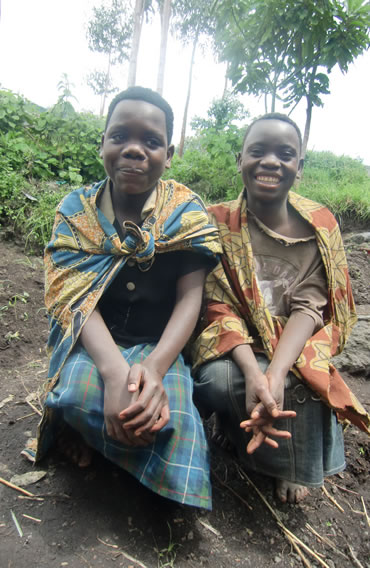Human Security

To promote the security of Batwa communities, BFSDA supports initiatives that address food, health, water, and housing insecurities which are leading causes of vulnerability, illness and death; thus;
Backyard Garden Initiative Garden Initiative for Food and Treatment (GIFT). FSDA promotes gardening for everyday nutrition purposes and treats malnutrition experienced in most Batwa households).
Establishing such a garden requires inputs from both an agronomist and a nutritionist. Each garden establishment costs $150, including training and garden inputs.
The gardens are mainly vegetable gardens with other quick maturing high nutrition-value crops to fight malnutrition, especially among children and expecting mothers.
Adequate human housing: Evicted from Bwindi and Mgahinga forests to make way for the mountain gorillas, very few Batwa received land, especially by humanitarian and religious partners, with the majority becoming squatters who live at the edges of national parks in other people’s land, often providing labour in exchange of in-kind food.
It is a sad state of affairs since they live in cramped, shabby, non-permanent houses that barely have a door. However, ADRA has purchased land to resettle some Batwa people and give them decent shelters. The Batwa Freedom and Security Development Agency works alongside ADRA to ensure all the Batwa get decent houses.
BFSDA facilitates the construction of adequate and dignified housing units for the most vulnerable Batwa households, including female and child-headed households or the elderly. Constructing a small house of 2 rooms, one for parents and one for children using Interlocking Soil Stabilization Blocks (ISSB) technology costs $2500.
Access to clean and safe water: BFSDA supports rainwater harvesting and treatment. Most Batwa families live as squatters or have been settled on mountain tops and can only access water downhill, with mostly women and girls spending up to 3 hours going down and uphill carrying water on their heads.
Access to health services: The Batwa community faces health issues like HIV, malnutrition, pneumonia, and other respiratory infections. The community depends on traditional herbs to treat the illness; however, with the encroachment of the forest, the conventional herds have decreased drastically, leading to more fatalities.
BFSDA facilitates targeted Batwa households’ access to public health services through a health access card as a mobilization technique to mobilize and encourage them to visit and utilize available health services, including maternity services by expecting mothers.
The Batwa people are often less inclined to visit health centers, saying the cost of care is too high and sometimes do not feel welcome by the staff[1]. Through the card scheme, the project will also engage and orient the health center workers in improved customer care and advocacy for an affirmative approach in serving the Batwa people to interesting them in visiting health centers. FSDA is also involved in sensitizing the Batwa people in the fight against COVID-19 transmission.
